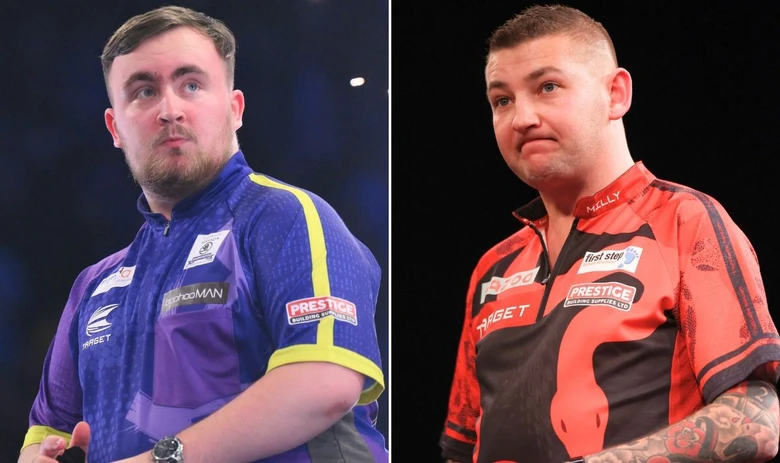In the high-octane world of professional darts, where every throw carries the weight of ambition, 18-year-old Luke Littler has emerged as a beacon of talent, captivating fans with his fearless precision. Yet, behind the cheers and 180s, a quieter tension brews. Nathan Aspinall, a revered figure in the sport and former UK Open champion, has pulled back the curtain on a troubling issue: the frosty reception Littler has received from some fellow players. “Luke is an incredible talent, and he’s only just getting started,” Aspinall said, his voice heavy with disappointment. “But it’s clear that not everyone is happy about how quickly he’s risen.” His candid remarks have ignited a conversation about camaraderie, envy, and the challenges facing darts’ brightest young star.
Littler’s ascent has been nothing short of meteoric. Since bursting onto the scene at the 2023 PDC World Championship as the youngest finalist at 16, the Warrington native has redefined expectations. His 2025 World Championship triumph, a 7-3 rout of Michael van Gerwen, and a Premier League title have solidified his status as a global sensation, earning him over £1 million in his debut year. With his 23-gram darts and unflappable demeanor, Littler has toppled veterans and thrilled crowds, drawing comparisons to legends like Phil Taylor. “He’s got the skill and the mentality to be one of the greats,” a commentator noted. Yet, Aspinall revealed that this rapid rise has stirred resentment among some peers, who have greeted Littler with cold shoulders rather than open arms. “Some players haven’t been as welcoming as they should be, and that’s disappointing,” Aspinall said, hinting at envy fueling the divide.
The darts circuit, with its tight-knit community and fierce rivalries, can be an unforgiving place for newcomers, especially one as disruptive as Littler. Aspinall’s comments point to a broader tension between the sport’s established hierarchy and its emerging stars. “Some are making it harder for him,” he said, suggesting that subtle slights or lack of support in practice rooms and backstage areas have added to Littler’s challenges. The pressure on the teenager is immense—every match is dissected, every loss magnified. “Luke is handling it all really well, but it’s not easy,” Aspinall admitted. “When you’re that young and trying to make your mark, the last thing you need is negativity from the people you’re supposed to be competing against.”
This dynamic isn’t new to darts, a sport where personalities clash as often as tungsten meets sisal. Veterans like Van Gerwen and Gary Anderson have faced their own battles breaking through, but Littler’s youth and rapid success make him a unique lightning rod. Social media reflects the divide, with fans praising his boldness—“Luke’s bringing new energy to darts!”—while others echo Aspinall’s concerns: “The old guard needs to support him, not freeze him out.” Littler’s maturity shines through, his focus unwavering despite the off-stage drama. In a recent Players Championship, he dispatched Stephen Bunting 6-1, his 103.7 average silencing doubters. Yet, the mental toll of navigating a less-than-welcoming environment is undeniable, as Aspinall noted: “It’s tough enough dealing with the pressure of performing, let alone worrying about how you’re being treated off the stage.”
Aspinall’s call to action is a plea for change. “We need to remember that players like Luke are the future of darts,” he urged, emphasizing the need to nurture young talent. “Instead of making it harder for them, we should be encouraging them, helping them grow, and celebrating what they bring to the game.” His words resonate in a sport riding a wave of popularity, with sold-out arenas and soaring TV ratings. Littler’s appeal—his boyish grin paired with ruthless checkouts—has drawn new fans, making his treatment a litmus test for darts’ culture. “We’ve all been there, starting out and trying to prove ourselves,” Aspinall added. “It’s up to all of us to make it a little bit easier for the next generation.”

